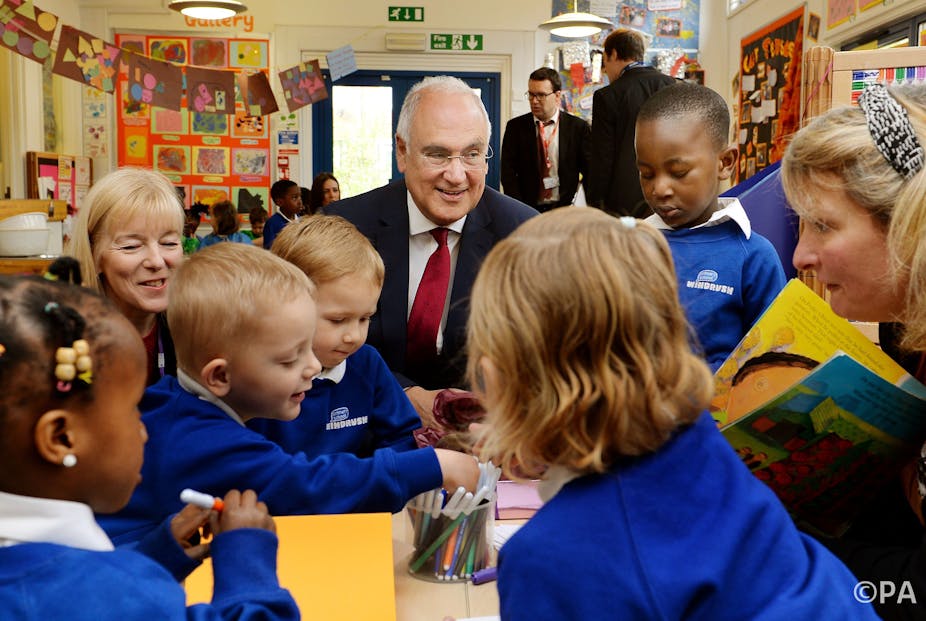Choosing a good quality nursery is one of the most important decisions any parent will make during the first years of their child’s life. In a recent report, UK school and childcare regulator Ofsted acknowledged that choosing a good quality nursery can be difficult for parents, because the information available to them is not clear and simple enough. Its head, Sir Michael Wilshaw, recommends making Ofsted inspection reports about individual nurseries or other early years providers clearer and more accessible.
But for many parents, reading the inspection reports on potential nurseries will only be part of their decision-making process. In recent research I carried out with the Daycare Trust, focus groups with parents showed that word of mouth and parents’ own visits were most important in helping them to make choices about quality.
So what are the key things a parent should look for when visiting a nursery? Knowing what high quality looks like for very young children can be particularly difficult. While many parents feel confident about what a good quality room for a four-year-old might look like, knowing what to look for in a baby or toddler room can be more difficult. We know from research that children under three have needs which are different to those of older children, and that they need to be cared for in a different way.
In a recent review of research on quality for children under the age of three we identified four key aspects of quality which are important in supporting children’s development and learning:
1. Stable relationships
A secure and stable relationship with their carers is the single most important element of quality for babies and toddlers. Continuity in staffing allows children to develop the strong bonds (attachments) which are so important for their development.
When visiting a nursery, ask about staff turnover, and also about the “key person” approach operated by most nurseries: identifying a named person who will be responsible for your child’s well-being and development.
Observe to see whether staff interact with children (including your child) in a way which is warm and responsive, and sensitive to their individual needs.
2. A focus on play
Young children learn best through play-based approaches rather than through formal teaching. Play supports children’s social, emotional, cognitive and physical development, and helps them learn to co-operate, negotiate and overcome challenges.
Observe and ask how the staff support children’s individual interests and learning through play. How will staff use what you tell them about your child’s interests to plan activities for him or her?
3. Support for communication and language
Children begin communicating in their first year of life, and adult support is critical in promoting this development in use and understanding of language. Do staff talk regularly to the children, including babies? Do you see evidence of conversations as well as one-off communications?
4. Opportunities to move be physically active
Young children need to be physically active in order to support their health and development, particularly during the early years as they learn to move, crawl and walk. Observe and ask how staff support children’s physical development. Is there outdoor space for play as well as indoor space?
Routines, staffing and links with parents
Other important aspects of quality identified by research include good quality care routines, hygiene and nutrition. This is especially important for babies, who are dependent on adults to meet their basic needs: ask about routines for mealtimes, sleeping and nappy changing, and how dietary requirements are made known to all staff.
As well as being warm and supportive with the children, staff need to be knowledgeable and well qualified. Ideally, staff working with children under three should have specialist knowledge of this age group. Staff ratios are also important for quality: the legal nursery ratio for babies is 1:3 and for two year olds, 1:4.
And finally, good quality nurseries have strong relationships with parents and see them as key partners in supporting children’s development. What opportunities are there for parents to be involved? How will they update you about your child’s progress? How will your child’s cultural background be reflected and respected?
The most important thing is to feel confident in your choice. We know from research that the quality of a child’s nursery is critical in supporting their development, and affects how successful they are as learners throughout their school life.
When visiting a nursery, read the Ofsted report beforehand and, on the day, take your time, ask lots of questions and make sure that you are able to observe the day-to-day life of the nursery as well as talking with the manager in their office.

